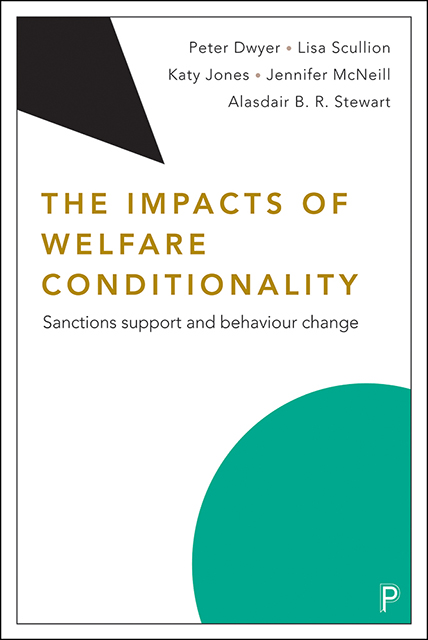Book contents
- Frontmatter
- Contents
- List of figures and tables
- List of abbreviations
- About the authors
- Acknowledgements
- One Introduction
- Two Conditionality in the UK welfare state
- Three Welfare conditionality and behaviour change
- Four From welfare to work? The effectiveness of welfare conditionality in moving people into paid employment
- Five Welfare conditionality and problematic or antisocial behaviour
- Six Unintended outcomes? The wider impacts of compulsion and benefit sanctions in social security
- Seven Ethical debates
- Eight Conclusions
- Methods appendix
- References
- Index
Six - Unintended outcomes? The wider impacts of compulsion and benefit sanctions in social security
Published online by Cambridge University Press: 17 June 2023
- Frontmatter
- Contents
- List of figures and tables
- List of abbreviations
- About the authors
- Acknowledgements
- One Introduction
- Two Conditionality in the UK welfare state
- Three Welfare conditionality and behaviour change
- Four From welfare to work? The effectiveness of welfare conditionality in moving people into paid employment
- Five Welfare conditionality and problematic or antisocial behaviour
- Six Unintended outcomes? The wider impacts of compulsion and benefit sanctions in social security
- Seven Ethical debates
- Eight Conclusions
- Methods appendix
- References
- Index
Summary
Chapters Four and Five considered the efficacy of welfare conditionality in moving recipients off social security benefits into paid work and also in relation to the reduction or cessation of harmful and antisocial behaviour. This chapter sets out and explores other significant key outcomes that ensue when ‘work first’ welfare conditionality is extensively promoted and rigorously implemented. The use of benefit sanctions is central to welfare conditionality within social security regimes and the first part of the chapter offers a commentary on the unprecedented rise (and subsequent fall) in the number of benefit sanctions within the UK (see Chapter Two, the social security system). Discussions in the second part of the chapter then set out the WelCond project’s key findings in relation to the implementation of sanction-backed social security regimes, that is, the universally detrimental impacts on the health, financial and emotional wellbeing of those subject to them. Building on this, the third part offers more detailed discussions of how, and why, compulsion alongside the threat and implementation of benefit sanctions prompt a number of unintended behavioural outcomes as people seek either to retain receipt of their benefits, or alternatively reject the imposition of welfare conditionality.
The great UK sanctioning drive
During the period 2010–16, characterised as the ‘great sanctioning drive’ (Webster, 2016), the routine use of benefit sanctions in the UK significantly increased, reaching an unprecedented peak in 2013 before falling away in subsequent years (see Figure 6.1). Between 2009/ 10 and 2013/ 14 more than one-fifth of all those individuals who claimed Jobseeker’s Allowance (JSA) were sanctioned at some point (that is, 1,833,035 of the 8,232,560 individuals who claimed JSA within the specified five-year period). It is estimated that in the year to 30 September 2014 there were approximately 895,000 JSA and Employment and Support Allowance (ESA) sanctions issued before reconsiderations and appeals (Webster, 2015). The National Audit Office estimated that in 2015 there were around 800,000 referrals for a sanction decision among claimants of Universal Credit (UC), JSA, ESA or Income Support (NAO, 2016).
- Type
- Chapter
- Information
- The Impacts of Welfare ConditionalitySanctions Support and Behaviour Change, pp. 116 - 136Publisher: Bristol University PressPrint publication year: 2022



